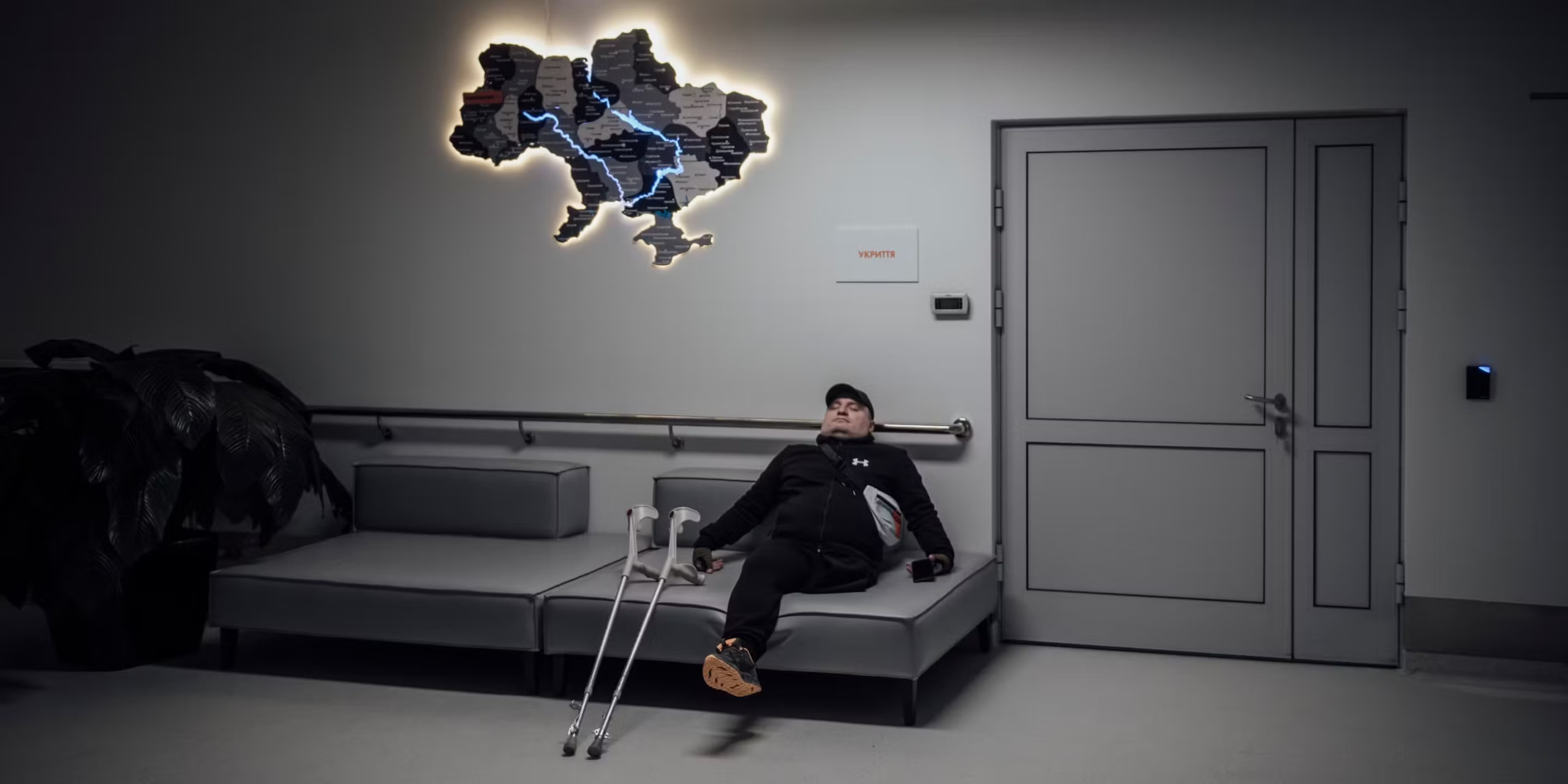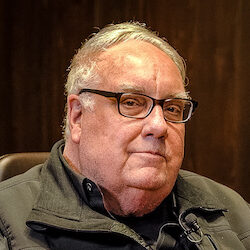Located in the west of the country, a rehabilitation site aptly called Superhumans takes in combatants who have suffered one, two or even four amputations.
The receptionist, Herman (those listed by first name wished to remain anonymous), had his left hand cut off by shrapnel from a tank shell on the Kreminna front and had to have his arm amputated. The so-called “first contact” therapist with the patients, Denys, was mowed down by an anti-tank rocket on the Bakhmut front, losing both legs and his left arm. Ruslana, the “recreational activities” therapist, had her left leg amputated after being hit by an artillery shell on the Kherson front.
These three severely wounded Ukrainian fighters came to the Superhumans rehabilitation center in Lviv, in the west of the country, on their release from hospital, and are now among the six patients who have not left. They have been hired to welcome their fellow wounded who arrive every day. “They have a special way of listening and understanding,” said Olga Rudneva, the center’s director. “The other therapists can’t quite understand what we’re going through,” explained Denys. During a trip to Germany for surgery, he met a Paralympic athlete who gave him the following advice: “Never listen to people who still have their legs, they don’t know what we’re talking about.”
In a war that has already left hundreds of thousands of soldiers from both countries dead and wounded – both Moscow and Kyiv keep the exact figures of their military losses secret – the combatants who arrive at Superhumans are among the hardest hit physically. They are victims of one, two, sometimes even four amputations, some also have a “broken face,” according to the expression coined to designate survivors mutilated in the face during the First World War.
Yet beyond the ravaged bodies, what strikes you about Superhumans is the incredibly energetic atmosphere. While there’s no doubt that these survivors of the most severe physical wounds that war can inflict face di”cult days and nights, they arrive here with dogged determination, try on their new prostheses with a smile and play sports while joking around. Some want to return to civilian life as normally as possible, while others hope to return to combat. “The mine clearers, who are usually amputees with one or two legs,” said Rudneva, “joke that demining will be less risky from now on, because at worst they’ll lose their prostheses.”
‘Fighting to keep on living’
Ruslana, elegantly dressed and made-up, barely limping, admitted that after the loss of a leg at the age of 19, she went through “di”cult times.” “I couldn’t sleep, I couldn’t eat. I don’t think I wanted to live anymore.” This daughter of soldiers, who joined the army in the early days of the Russian invasion, saw her parents “in tears” at the hospital in Odesa. Three months after being mowed down by a shell and one month after arriving at Superhumans, she was walking without a cane. She was determined, she said, to “keep on fighting to live.”
Serhiy, who by his own admission was “a criminal” before the war, was surprised by the Russian invasion and occupation of the region while in prison in Kherson. After the recapture of the city by the Ukrainian army, he decided to “break with the past” and joined the 23rd Mechanized Brigade. Sent to the Zaporizhzhia front, he became a lieutenant and commanded a reconnaissance unit. In fall 2023, while infiltrating enemy territory, a tank spotted Serhiy’s unit and fired, resulting in 12 dead.
“All my men were killed, I’m the only survivor,” said the o”cer. An amputee with one leg, he arrived at the Superhumans Center in January and is already walking again. Although he won’t be doing any more reconnaissance operations, he’s looking forward to returning to the 23rd brigade, which has meanwhile been moved to the Avdiivka front. “I can be useful for mapping and other tasks.”
Given the seriousness of his injuries, Vyacheslav, a cab driver in Odesa before the war, will never return to the army. Enlisted in an infantry battalion made up of volunteers from the port city, he was wounded in early 2023 on the Avdiivka front. Wounded in the legs by bullets and shrapnel, he was abandoned in a trench conquered by Russian forces and taken prisoner. In captivity, his wounds went untreated. His legs became infected and his hands froze.
“I was dying, I think, until Chechen fighters ‘bought’ me from Russian forces, took me to Grozny and hospitalized me. They needed Ukrainian prisoners to exchange for their boys,” said Vyacheslav. “They saved my life.” Once in hospital, not only was it too late to save his legs, but it was impossible to save his hands. Vyacheslav became a quadruple amputee.
‘We have to accept ourselves as we are’
Returned to Ukraine during a prisoner exchange between the two countries, the injured man has been at Superhumans for three months. “My leg prostheses are already ready and, for the past month, I’ve been learning to walk again. It’s di”cult, I still have trouble keeping my balance, but I’m making progress. And tomorrow, I’m going to try out my arm prostheses,” Vyacheslav said with a smile. His morale seemed unshaken. He trains to walk two hours a day and swims in the pool, supported by a machine suspended from a winch. During breaks, his mother attaches a fork to one of his severed arms so that he can slip a cigarette between two points and smoke to his heart’s content.
Despite the extent of their injuries and su!ering, none of the wounded at the Superhumans Center claim to have any regrets. While Serhiy wants to “continue serving” the army, Vyacheslav feels proud he has “protected the country.” “Like everyone else, I went to the front so that the rear would not become the front,” to protect Kyiv, his city of Odesa, his family and those of others. “The rest, the wounds and the captivity, that just happened.” With a smile, he closed the conversation on the conflict. His war, from now on, is linked to four prostheses and a burning desire to “work again one day” and, why not, again, as a driver.
Zakhar, sitting in the hall with his wife, even continues to be “active and useful” during his rehabilitation. He “contributes however [he] can” to the life of his unit, whose name he cannot reveal because it belongs to the Special Forces. On the Zaporizhzhia front in the summer of 2023, he was about to launch a grenade-equipped drone when a Russian shell struck nearby. “The blast detonated the grenade in my hands.”
Zakhar lost both hands, his right leg, one eye and hearing in one ear. Having arrived at the center a month ago, he is now testing prostheses. “We have to accept ourselves as we are,” he said. “As for the war, nothing changes: It will be until the destruction of the enemy and victory!” Zakhar hopes to “still be able to throw grenades” toward the Russian lines
when he learns how to “use [his] new hands.”
‘Around 40,000 amputees’
Opened in April 2023, the Superhumans Center, aptly named by its founders, welcomes “the most seriously injured” and “the most motivated people,” said Rudneva. More than 300 patients have completed the rehabilitation process, and around 50 come every day to take part. It’s a drop in this war’s ocean – a government source confirmed that Ukrainian amputees number “around 40,000, almost all of them military.”
It may just be the beginning, but it encapsulates a mountain of energy and hope. Among Superhumans’ projects for 2024, Rudneva announced a surgical center dedicated to facial reconstruction and a residence so that the wounded can live on site. Thanks to the support of wealthy foreign philanthropists and donations from Ukrainians, the association does not require any public funding. Superhumans’ success is also due to the training of disabled sports teams. With its high-tech prostheses and sporting spirit, the association is changing the way Ukraine sees disability. “We welcome people who, everywhere else, have been told ‘It’s impossible,'” said Andriy Ischyk, one of Rudneva’s collaborators. “We believe that no rehabilitation is impossible, and we find solutions. Some patients go home talking about ‘a miracle,’ which is very moving.”
Herman, the arm-amputee receptionist, is about to travel to the US to take part in athletics and rowing competitions. When he returns, he’ll be reunited with his wife, who will have given birth to their daughter by then. As for Ruslana, the young therapist with the amputated leg, she believes that a year after the injury, “the love of life is even stronger than before.”

